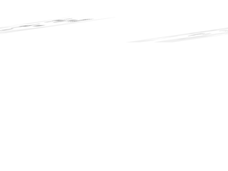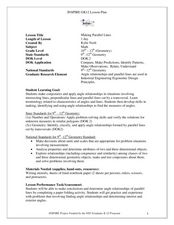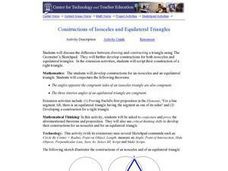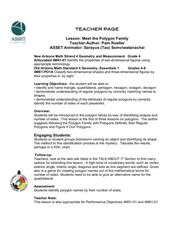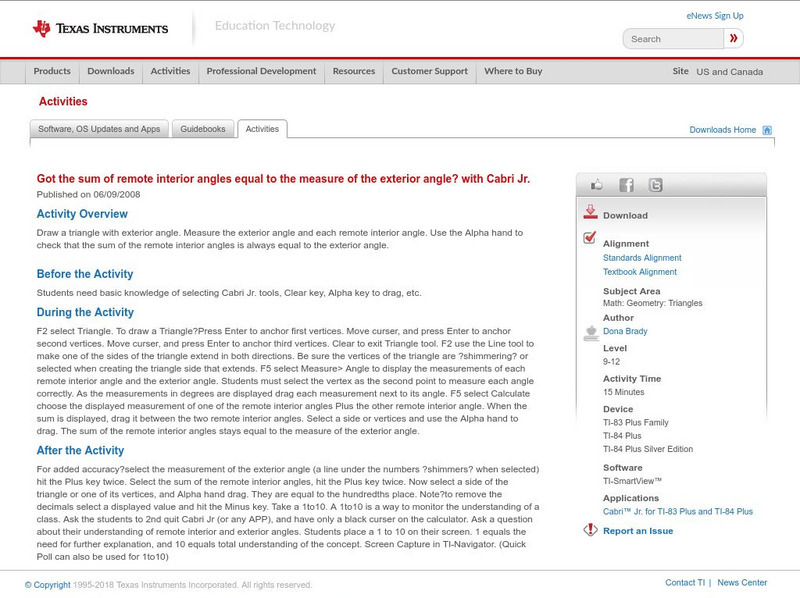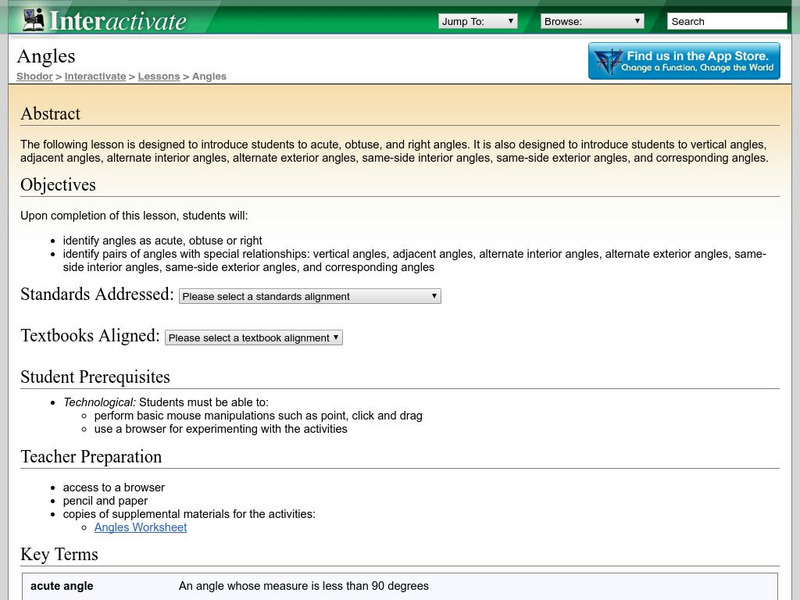Curated OER
Properties of the Centers of a Triangle
High schoolers investigate properties of the four centers of a triangle and explore a special property of the circumcenter and orthocenter of a triangle. This lesson plan requires the use of Cabri, Jr.
EngageNY
Secant Lines; Secant Lines That Meet Inside a Circle
Young mathematicians identify different cases of intersecting secant lines. They then investigate the case where secant lines meet inside a circle.
Curated OER
Can You Name That Shape?
Learners use materials to build, investigate, and draw two-dimensional shapes (polygons). They combine the shapes they have built and draw from the pile to begin a round-robin activity to name and determine the attributes of a selection...
Curated OER
Algebra/Geometry Institute: Area of Polygons
Middle schoolers find the area of polygons. In this area of polygons lesson, students find the area of parallelograms, rectangles, squares, and other polygons. They identify each given figure and determine the appropriate...
Curated OER
Making Parallel Lines
Students differentiate between parallel and perpendicular lines. In this geometry instructional activity, students make conjectures and apply it to solve real life situations. They collect data and make predictions based on the data.
Curated OER
Tessellations
Learners create tessellations. In this geometry lesson, students use polygons to create different patterns by rotation. They identify the reasons for polygons to create the type of tessellation it does.
Curated OER
Obtuse Triangles
Fourth graders explore obtuse triangles. In this geometry lesson plan, 4th graders make obtuse triangles with paper and scissors. They determine how to find the center of their triangle.
Curated OER
Exploring the Properties of Rectangular Prisms.
Learners define properties of rectangular prisms. In this geometry lesson, students identify the relationship between two and three dimensional objects. They use Cabri technology to graph their figures.
Curated OER
Exploring Properties of Rectangular Prisms
Students explore the properties of rectangular prisms. In this geometry lesson, students identify properties of two and three dimensional shapes. They use Cabri technology to create polygons and solve problems.
Curated OER
Equilateral Triangles
Young scholars examine the attribute of equilateral triangles. In this equilateral triangle lesson plan, students examine a number of paper triangles to determine how they are classified. They determine how triangles are depicted in...
Curated OER
Tiling the Plane
Fifth graders use pattern blocks and triagular grid paper to reivew shape names, be introduced to the concept of a tiling of the plane, and determine which pattern blocks tile the plane. They are asked if they comprehend what a...
Curated OER
Designing a Quilt Pattern
Students create and color a one-patch quilt design based upon a regular hexagon. They examine quilts and photos of quilt designs, read a handout, and complete their quilt design on a worksheet.
Curated OER
Constructions of Isosceles and Equilateral Triangles
Students explore the difference between drawing and constructing a triangle utilizing The Geometer's Sketchpad on the computer. They create, develop and script constructions for both isosceles and equilateral triangles. Each student has...
Curated OER
Structures and Shapes
Students make jewelry using different shapes from magazines, tissue paper, cardboard, and other materials. In this making jewelry lesson plan, students complete this hands on activity to discuss how shapes are used.
Curated OER
Area of irregular Polygons: Historical Motivator - Lewis and Clark Adventure
Seventh graders find the area of irregular polygons. In this lesson on calculating area, 7th graders use the adventures of Lewis and Clark as motivation to learn how to calculate the area of irregular polygons.
Curated OER
Polygons All Around Us!
Students explore the concept of polygon properties. In this polygon properties lesson plan, students draw polygons with different numbers of sides such as pentagons, octagons, hexagons, etc. Students identify different geometric shapes...
Curated OER
Meet the Polygon Family
Fourth graders investigate regular polygons. In this regular polygon lesson, 4th graders explore the attributes of different polygons. Students work in groups to complete a KWL chart regarding polygons.
Curated OER
Hidden Jewels of Geometry
Students identify different geometric shapes, and arrange them artistically in original jewelry designs.
Texas Instruments
Texas Instruments: Sum of Remote Interior Angles Equals Exterior Angle
Draw a triangle with exterior angle. Measure the exterior angle and each remote interior angle. Use the Alpha hand to check that the sum of the remote interior angles is always equal to the exterior angle.
Government of Alberta
Learn Alberta: Math Interactives: Exploring Angles Within a Triangle
This multimedia Learn Alberta math resource looks at angles of a triangle in the context of building bikes and choosing bike sizes. The accompanying interactive component lets students explore build different sized triangles while...
CK-12 Foundation
Ck 12: Geometry: Interior Angles in Convex Polygons
[Free Registration/Login may be required to access all resource tools.] This concept teaches students how to calculate the sum of the interior angles of a polygon and the measure of one interior angle of a regular polygon.
Shodor Education Foundation
Shodor Interactivate: Lesson: Angles
This upper elementary and middle school lesson plan introduces the concept of acute, obtuse and right angles. Also, as the lesson proceeds vertical, adjacent, alternate interior and alternate exterior angles are explored. Plenty of...
Oswego City School District
Regents Exam Prep Center: Polygons: Interior and Exterior Angles
A great resource where you can learn how to calculate the measures of the interior and exterior angles of any regular polygon with these tutorials. There are several practice pages for someone to try. The teacher resource page includes...
Math Open Reference
Math Open Reference: Angles
Everything you wanted to know about angles and more, including 1) how to measure angles 2) types of angles 3) angle relationships and 4) angles around a transversal.





